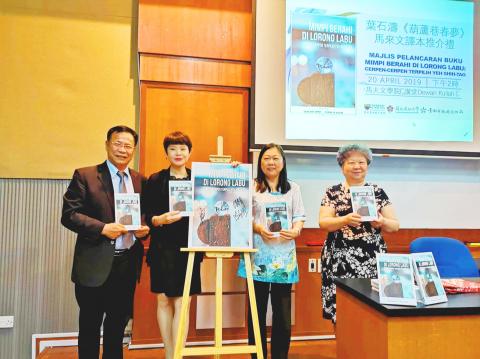A collection of short stories by Taiwanese writer Yeh Shih-tao (葉石濤) has been translated into Malay, further improving cultural exchanges between the two nations, a Tainan official said on Saturday last week.
At a news conference in Kuala Lumpur for the publication of Spring Dream at Gourd Alley — Short Stories by Yeh Shih-tao (葫蘆巷春夢-葉石濤短篇小說), Tainan Cultural Affairs Bureau Deputy Director-General Chou Ya-ching (周雅菁) said that she was happy to see the book published, as it includes many stories that depict Tainan’s culture and food, giving Malaysian readers a better understanding of the city’s culture.
Tainan is working to position itself as a city of Taiwanese literature and has established a program to encourage translations of literary works, bureau Director-General Yeh Tse-shan (葉澤山) said on the government’s New Southbound Policy Portal Web site.

Photo: CNA
Yeh’s fiction has already been translated into several languages, including Vietnamese, English, Japanese and Korean, the Web site said.
Fan Pik Wah (潘碧華), head of the University of Malaya’s Department of Chinese Studies, said that the book was mainly translated by seven Malaysian-Chinese students and one ethnic Malay student who is proficient in Chinese.
They were helped by a Malaysian writer, who spent 20 days editing the text to include more Malay literary devices to make the content more accessible to Malaysian readers, Fan said.
Yeh was born in Tainan in 1925, and his writings “reflect the island’s diverse culture and define him as an important, quintessentially Taiwanese author,” the Web site says.
Many of his novels are based on characters and events in Tainan, including “snaking alleyways, incense-filled temples and local snacks” that were often featured in his works and “came to serve as icons of the city,” it says.

DEFENSE: The National Security Bureau promised to expand communication and intelligence cooperation with global partners and enhance its strategic analytical skills China has not only increased military exercises and “gray zone” tactics against Taiwan this year, but also continues to recruit military personnel for espionage, the National Security Bureau (NSB) said yesterday in a report to the Legislative Yuan. The bureau submitted the report ahead of NSB Director-General Tsai Ming-yen’s (蔡明彥) appearance before the Foreign and National Defense Committee today. Last year, the Chinese People’s Liberation Army (PLA) conducted “Joint Sword-2024A and B” military exercises targeting Taiwan and carried out 40 combat readiness patrols, the bureau said. In addition, Chinese military aircraft entered Taiwan’s airspace 3,070 times last year, up about

The Overseas Community Affairs Council (OCAC) yesterday announced a fundraising campaign to support survivors of the magnitude 7.7 earthquake that struck Myanmar on March 28, with two prayer events scheduled in Taipei and Taichung later this week. “While initial rescue operations have concluded [in Myanmar], many survivors are now facing increasingly difficult living conditions,” OCAC Minister Hsu Chia-ching (徐佳青) told a news conference in Taipei. The fundraising campaign, which runs through May 31, is focused on supporting the reconstruction of damaged overseas compatriot schools, assisting students from Myanmar in Taiwan, and providing essential items, such as drinking water, food and medical supplies,

STRICTER ENFORCEMENT: Taipei authorities warned against drunk cycling after a sharp rise in riding under the influence, urging greater public awareness of its illegality Taipei authorities have issued a public warning urging people not to ride bicycles after consuming alcohol, following a sharp rise in riding under the influence (DUI) cases involving bicycles. Five hundred and seven people were charged with DUI last year while riding YouBikes, personal bicycles, or other self-propelled two-wheelers — a fourfold increase from the previous year, data released by the Taipei Police Department’s Traffic Division showed. Of these, 33 cases were considered severe enough to be prosecuted under “offenses against public safety,” the data showed. Under the Road Traffic Management and Penalty Act (道路交通管理處罰條例), bicycles — including YouBikes and other

A magnitude 4.3 earthquake struck eastern Taiwan's Hualien County at 8:31am today, according to the Central Weather Administration (CWA). The epicenter of the temblor was located in Hualien County, about 70.3 kilometers south southwest of Hualien County Hall, at a depth of 23.2km, according to the administration. There were no immediate reports of damage resulting from the quake. The earthquake's intensity, which gauges the actual effect of a temblor, was highest in Taitung County, where it measured 3 on Taiwan's 7-tier intensity scale. The quake also measured an intensity of 2 in Hualien and Nantou counties, the CWA said.